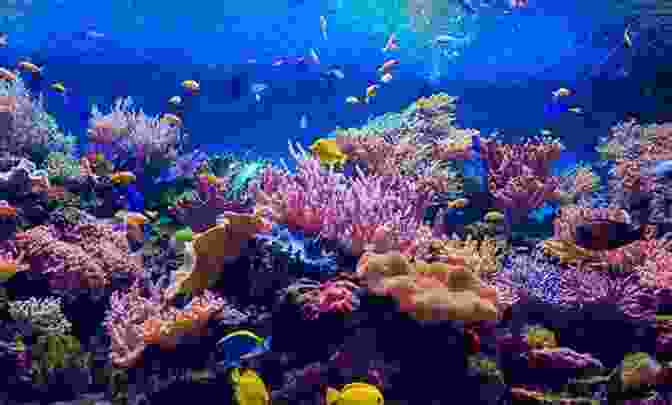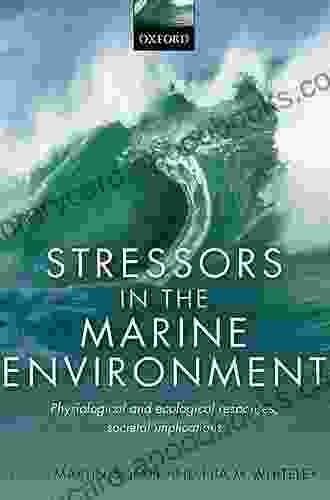Understanding Stressors in the Marine Environment: A Comprehensive Guide


4.5 out of 5
| Language | : | English |
| File size | : | 15877 KB |
| Text-to-Speech | : | Enabled |
| Enhanced typesetting | : | Enabled |
| X-Ray for textbooks | : | Enabled |
| Print length | : | 384 pages |
| Lending | : | Enabled |
| Screen Reader | : | Supported |
The marine environment, covering over 70% of the Earth's surface, supports an astonishing array of life forms and plays a vital role in regulating our planet's climate and ecosystems. However, human activities have placed immense pressure on marine ecosystems, introducing various stressors that threaten their health and sustainability. This article aims to provide a comprehensive overview of stressors in the marine environment, their impacts, and potential mitigation strategies.
Types of Stressors
Stressors in the marine environment can be classified into several categories:
- Pollution: Pollution from industrial activities, sewage discharge, and agricultural runoff introduces harmful substances into the marine environment. These pollutants can include heavy metals, plastics, pesticides, and toxic chemicals, which can damage marine organisms and disrupt ecosystem functions.
- Climate Change: Rising global temperatures, ocean acidification, and altered weather patterns due to climate change are significantly impacting marine ecosystems. These changes can lead to coral bleaching, habitat loss, disruptions in marine food webs, and increased vulnerability to disease.
- Habitat Loss: The destruction or degradation of critical marine habitats, such as coral reefs, seagrass beds, and mangrove forests, due to coastal development, dredging, and pollution, can have devastating consequences for marine life. These habitats provide shelter, food, and breeding grounds for a wide range of species.
- Overfishing: Excessive fishing practices can deplete fish stocks, disrupt marine food webs, and alter the structure and function of marine ecosystems. Bycatch, the unintended capture of non-target species in fishing gear, can also contribute to marine biodiversity loss.
Impacts of Stressors
Stressors in the marine environment have far-reaching impacts on marine ecosystems and biodiversity:
- Marine Life Mortality: Exposure to pollutants, habitat loss, and overfishing can directly harm or kill marine organisms, leading to population declines and disruptions in food webs.
- Habitat Degradation: Pollution, climate change, and habitat loss can degrade marine habitats, reducing their suitability for supporting marine life and affecting the overall health and productivity of ecosystems.
- Loss of Biodiversity: Overfishing and habitat loss can lead to the loss of marine species, reducing ecosystem resilience and the provision of ecosystem services.
- Economic Consequences: Stressors in the marine environment can have significant economic impacts, affecting fisheries, tourism, and other industries that rely on healthy marine ecosystems.
Mitigation and Management Strategies
Addressing stressors in the marine environment requires a comprehensive and collaborative approach involving governments, industries, and individuals:
- Pollution Control: Implementing regulations and technologies to reduce pollution from industrial, agricultural, and municipal sources is essential for mitigating its impacts on marine ecosystems.
- Climate Change Mitigation: Reducing global greenhouse gas emissions and implementing adaptation measures to address the effects of climate change on marine ecosystems are crucial for preserving their health and biodiversity.
- Habitat Protection: Establishing marine protected areas, regulating coastal development, and restoring degraded habitats can help protect and restore critical marine ecosystems.
- Sustainable Fishing Practices: Implementing sustainable fishing practices, reducing bycatch, and managing fisheries to ensure sustainable fish stocks are essential for maintaining healthy marine ecosystems.
- Public Education: Raising awareness about the importance of the marine environment and the impacts of human activities can foster stewardship and encourage individuals to adopt sustainable practices.
Understanding stressors in the marine environment and their impacts is essential for protecting and preserving the health and sustainability of our oceans. By implementing mitigation and management strategies, governments, industries, and individuals can work together to reduce stressors, conserve marine ecosystems, and ensure the long-term well-being of our planet.
4.5 out of 5
| Language | : | English |
| File size | : | 15877 KB |
| Text-to-Speech | : | Enabled |
| Enhanced typesetting | : | Enabled |
| X-Ray for textbooks | : | Enabled |
| Print length | : | 384 pages |
| Lending | : | Enabled |
| Screen Reader | : | Supported |
Do you want to contribute by writing guest posts on this blog?
Please contact us and send us a resume of previous articles that you have written.
 Book
Book Novel
Novel Page
Page Chapter
Chapter Text
Text Story
Story Genre
Genre Reader
Reader Library
Library Paperback
Paperback E-book
E-book Magazine
Magazine Newspaper
Newspaper Paragraph
Paragraph Sentence
Sentence Bookmark
Bookmark Shelf
Shelf Glossary
Glossary Bibliography
Bibliography Foreword
Foreword Preface
Preface Synopsis
Synopsis Annotation
Annotation Footnote
Footnote Manuscript
Manuscript Scroll
Scroll Codex
Codex Tome
Tome Bestseller
Bestseller Classics
Classics Library card
Library card Narrative
Narrative Biography
Biography Autobiography
Autobiography Memoir
Memoir Reference
Reference Encyclopedia
Encyclopedia Rebecca Bower
Rebecca Bower Ana Castillo
Ana Castillo John Miculek
John Miculek Zac Miller
Zac Miller Clare Crellin
Clare Crellin Susan Penny
Susan Penny Zach Wahls
Zach Wahls Loretta Jackson
Loretta Jackson Ana Carbajosa
Ana Carbajosa Amy Gutmann
Amy Gutmann William Mcmillen
William Mcmillen Andrea Cecon
Andrea Cecon Richard W Carney
Richard W Carney Amanda Oosthuizen
Amanda Oosthuizen Andie Solar
Andie Solar Kenny Chesney
Kenny Chesney Jim Galiano
Jim Galiano Kat Vellos
Kat Vellos James Reed
James Reed Sandor Ellix Katz
Sandor Ellix Katz
Light bulbAdvertise smarter! Our strategic ad space ensures maximum exposure. Reserve your spot today!

 Floyd RichardsonOne Shelter Volunteer, Countless Dogs, and the Quest to Find Them All Homes
Floyd RichardsonOne Shelter Volunteer, Countless Dogs, and the Quest to Find Them All Homes Charles DickensFollow ·8.3k
Charles DickensFollow ·8.3k Jacob FosterFollow ·7.7k
Jacob FosterFollow ·7.7k Hugo CoxFollow ·11.5k
Hugo CoxFollow ·11.5k Louis HayesFollow ·8.3k
Louis HayesFollow ·8.3k Jarrett BlairFollow ·10.8k
Jarrett BlairFollow ·10.8k Scott ParkerFollow ·9.4k
Scott ParkerFollow ·9.4k James HayesFollow ·15.1k
James HayesFollow ·15.1k Colin RichardsonFollow ·7.8k
Colin RichardsonFollow ·7.8k

 Roald Dahl
Roald DahlImmerse Yourself in a Mesmerizing Tapestry of Creativity:...
Prepare to be captivated by "Spectra," an...

 Clarence Brooks
Clarence BrooksUnleash Your Inner Taylor with Red Piano Vocal Guitar:...
Embrace the Red Era...

 Jeffrey Hayes
Jeffrey HayesUnlock Your Child's Academic Potential: A Comprehensive...
In today's rapidly changing...

 William Golding
William GoldingBrave Elizabeth: A Captivating Tale of Resilience and...
Immerse Yourself in a Riveting Historical...

 Curtis Stewart
Curtis StewartUnveiling the Heartfelt Melodies of Taylor Swift: A...
Step into the enchanting world of Taylor...
4.5 out of 5
| Language | : | English |
| File size | : | 15877 KB |
| Text-to-Speech | : | Enabled |
| Enhanced typesetting | : | Enabled |
| X-Ray for textbooks | : | Enabled |
| Print length | : | 384 pages |
| Lending | : | Enabled |
| Screen Reader | : | Supported |












